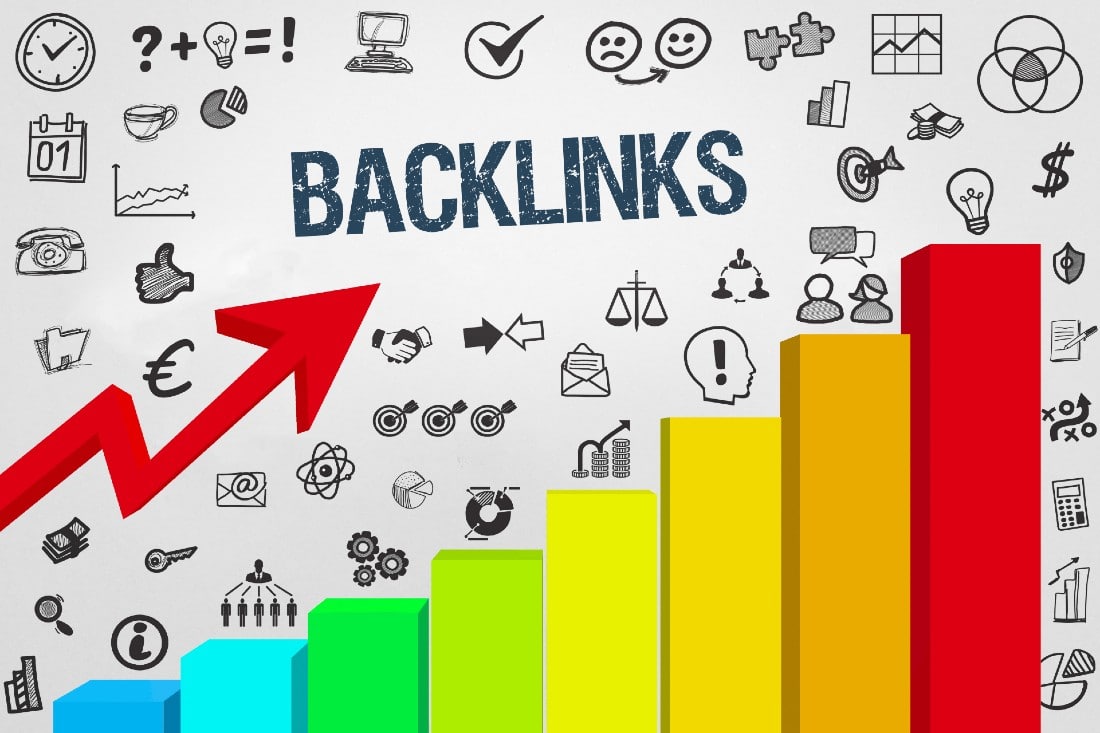university.nakul@gmail.com | Posted on | Education
Top Backlink Websites: Boost Your SEO with This Ultimate Guide
| Posted on
In the ever-evolving digital marketing industry, backlinks are the cornerstone of effective SEO strategies. Backlinks or internal links are links from one website to another website. They act as a sign of trust from one site to another, showing search engines that the linked content is important and authentic. In this guide, we'll explore the importance of backlinks, how to get quality backlinks, and new strategies to boost your website's SEO.

Understanding the Importance of Backlinks
Backlinks are very important for SEO because they act as validation for your website. When a popular website links to your content, it shows search engines like Google that your content is authentic and relevant. This trust leads to higher search engine rankings, as it leads to more organic traffic to your website.
According to Moz, backlinks are one of the three ranking factors used by Google, along with content and Rank Brain, Google's artificial intelligence algorithm. However, not all backlinks are created equal. The quality of backlinks is more important than quantity. A link from a reputable site such as Forbes or the New York Times carries more weight than many links from lesser-known publications. Therefore, focusing on getting high-quality backlinks is essential to a successful SEO strategy.
Types of backlinks
Backlinks can be classified into different types, which will affect the SEO of your website:
1. Edit backlinks: these are backlinks that appear only when other websites to your content because they link to your content. Think of it as important and meaningful. For example, if you publish a comprehensive guide on a popular topic, other authors or reporters will link to your guide as a resource.
2. Guest Post Back Links: Guest posting is writing articles for other websites in your industry. Instead, you usually get a link to your website in the author's bio or the content itself. This is a popular way to get high-quality backlinks because it positions you as an expert in your field.
3. Directory Submissions: While not as powerful as they used to be, directory submissions can still be effective if done correctly. Submitting your website to specific directories related to your industry can provide you with valuable backlinks.
4. Social Backlinks: Even though links from social media are "no-follow" (meaning they don't carry SEO value), they can still drive traffic to your website and help your content to be found, it can get more organic responses.
5. Affiliate Conferences: Participating in industry-related conferences and including a link to your website in your signature and posts can also provide backlinks. However, these things must be done in the right contexts to avoid being considered spam.
6. Infographic Backlinks: Infographics are a popular way to get backlinks because they look good and are easy to share. When you create a high-quality infographic, other websites can embed it in their content and link to your website.

How to get high-quality backlinks
1. Create high-quality content: The basis of getting backlinks is to create content that others want to link to. It includes in-depth guides, case studies, research reports, and illustrated information. The key is to produce content that is most useful to your audience and turn it into a resource for others to talk about.
2. Reach out to relevant websites: After creating quality content, reach out to websites in your industry and let them know about your content. Personalize your newsletters and explain how your content will benefit their readers. This strategy, known as email screening, can increase your chances of getting backlinks.
3. Use broken link building: This strategy involves looking for broken links on other sites and considering your content as an alternative. Tools like Ahrefs and SEMrush can help you identify broken links in your industry. When you find a broken link, contact the site owner, inform them about the broken link, and submit your content as a premium feature.
4. Guest Blogging: As mentioned earlier, guest blogging is an effective way to get backlinks. The key is to focus on popular websites in your niche and provide quality content that your audience will find. Make sure the guest posts are informative and well-written because the site owner will link to your site.
5. Use the Skyscraper Technique: Created by Brian Dean of Backlinko, the Skyscraper Technique finds popular content in your niche, creates a better version, and then promotes it to the right audience. This strategy works because you're building on something that's already successful, and it's easier to get backlinks.
6. Take part in expert posts: Roundup posts collect thoughts, views, and advice from different experts on a topic. You can get backlinks from the hosting site by participating in these posts. To get involved, contact bloggers or webmasters who frequently publish circulars and offer your expertise.
7. Monitor the backlinks of your competitors: By focusing on the backlinks of your competitors you can understand the link-building opportunities. Tools like Ahrefs, SEMrush, and Moz can help you analyse your competitors' backlink information and identify sites that are more likely to link to your content.
Best Ways to Backlink
1. Focus on quality over quantity: One high-quality backlink from a popular site is worth more than many low-quality links. Always make sure to get links from sites that have high authority and are relevant to your niche, especially when utilizing niche edits to enhance your SEO strategy.
2. Increase your backlink profile: Having a diverse backlink profile is very important for SEO. Relying too much on one type of feedback can be problematic. Try to get links from different sources like blogs, discussion sites, directories and forums.
3. Avoid Black Hat SEO Tactics: Black Hat SEO tactics like buying backlinks and using link farms can lead to search engine penalties. Stick to SEO and white hat techniques to ensure long-term success.
4. Check your backlinks regularly: To keep your backlinks healthy and relevant, it is very important to review your backlink information. Tools like Google Search Console, Ahrefs, and SEMrush can help you identify and remove toxic backlinks that can harm your site's ranking.
5. Keep up with SEO trends: SEO and backlink strategies are constantly changing. Stay up to date with the latest SEO trends and algorithm changes to ensure your backlink efforts continue to be effective.
Conclusion
Backlinks are still an important part of any successful SEO strategy. By focusing on getting high-quality backlinks from reputable sources, you can increase your website's credibility, improve your search engine ranking, and generate organic traffic.
Remember, the key to backlink success is creating effective content, engaging in ethical practices, and constantly refining your strategies based on the latest SEO trends. Done right, backlinks can be a powerful tool in your digital marketing arsenal and help you achieve long-term success in a competitive environment.
0
0 Comment
university.nakul@gmail.com | Posted on
In the competitive world of digital marketing, Search Engine Optimization (SEO) is the key to online visibility and success. One of the most powerful tools in the SEO toolkit is backlinks. Backlinks not only help in improving your website's search engine rankings but also enhance your site's credibility and authority. This comprehensive guide will delve into the concept of backlink websites, their importance in SEO, and effective strategies to build high-quality backlinks. By the end of this guide, you'll have a clear understanding of how to leverage backlinks to boost your website's performance.

What is a Backlink Website?
-
Definition and Importance:
A backlink website is any platform or webpage where you can obtain a link that directs users back to your site. These links, commonly known as backlinks, are crucial for SEO because they act as endorsements from other websites. When multiple reputable sites link to your content, search engines perceive your website as valuable and relevant, thereby improving your ranking in search results. -
How Backlinks Work:
Backlinks work by sending referral traffic from one site to another. When a user clicks on a backlink, they are directed to the linked site, which can lead to increased traffic and potential conversions. More importantly, search engines like Google consider backlinks as a vote of confidence. The more quality backlinks a site has, the higher it is likely to rank in search engine results pages (SERPs).
Importance of Backlinks in SEO
-
Search Engine Ranking:
Backlinks are one of the top-ranking factors for search engines. Google’s algorithm, for instance, heavily relies on backlinks to determine the credibility and relevance of a website. A site with numerous high-quality backlinks is more likely to rank higher than a site with few or low-quality backlinks. -
Authority Building:
Backlinks from authoritative websites help establish your site as a trusted source of information. When well-established sites link to your content, it signals to search engines that your site is a reliable source. Over time, this can significantly boost your domain authority, leading to better rankings and more organic traffic. -
Increased Traffic:
High-quality backlinks can drive a significant amount of referral traffic to your site. Users who visit authoritative sites and find links to your content are more likely to click on them, bringing more visitors to your site. This not only increases your traffic but also improves your chances of converting visitors into customers. -
Enhanced Credibility:
In the digital landscape, credibility is everything. Backlinks from reputable sources enhance your site’s credibility in the eyes of both users and search engines. This can lead to more trust from your audience, higher engagement, and ultimately, better conversion rates.
Types of Backlinks: DoFollow vs. NoFollow
-
DoFollow Backlinks:
DoFollow backlinks are the standard type of backlinks that pass on "link juice" or SEO value from the linking site to the linked site. These backlinks are crucial for improving your site’s search engine rankings. When a reputable site links to your content with a DoFollow link, it tells search engines that your site is trustworthy and authoritative, which can lead to higher rankings. -
NoFollow Backlinks:
NoFollow backlinks, on the other hand, do not pass on SEO value. These links include a special HTML attribute that instructs search engines not to count the link as an endorsement. While NoFollow links don't directly impact your rankings, they are still valuable for driving traffic and increasing brand visibility. Additionally, a natural backlink profile contains a mix of both DoFollow and NoFollow links, which can help avoid penalties from search engines for over-optimization. -
When to Use Each Type:
Understanding when to use DoFollow and NoFollow backlinks is key to a successful SEO strategy. Use DoFollow links when you want to boost your site’s authority and rankings. NoFollow links are ideal for situations where you want to avoid passing SEO value, such as in sponsored content, paid links, or user-generated content like blog comments.

How to Find Quality Backlink Websites
-
Identify High-Authority Sites:
Finding quality backlink websites starts with identifying high-authority sites in your niche. These are websites with a high Domain Authority (DA) score, indicating that they are trusted by search engines. Tools like Moz’s Link Explorer or Ahrefs can help you analyze a site’s DA and determine if it’s a good target for backlinks. -
Relevance and Niche Specificity:
Relevance is crucial when building backlinks. Links from websites within your niche or industry carry more weight than links from unrelated sites. Search engines consider backlinks from niche-relevant sites as more credible because they indicate that your content is valuable within a specific context. -
Competitor Analysis:
Analyzing your competitors’ backlink profiles can provide valuable insights into where they are getting their backlinks from. Tools like SEMrush or Ahrefs allow you to see which sites are linking to your competitors, helping you identify potential backlink opportunities for your own site. -
Content Quality and Link Worthiness:
To attract quality backlinks, your content must be link-worthy. This means creating high-quality, informative, and engaging content that other sites would want to link to. Resources like in-depth guides, research studies, infographics, and case studies are examples of content types that often attract backlinks.
Techniques to Earn Backlinks
-
Guest Posting:
Guest posting involves writing and publishing articles on other websites within your niche. This not only helps you gain exposure to a new audience but also allows you to include a backlink to your site. When guest posting, focus on high-authority sites that are relevant to your niche for maximum SEO benefits. -
Content Creation and Marketing:
Creating valuable content is one of the most effective ways to earn backlinks. Content that is informative, well-researched, and engaging is more likely to be shared and linked to by other websites. Consider creating content such as how-to guides, expert roundups, or unique research studies that provide value to your audience. -
Broken Link Building:
Broken link building is a strategy where you find broken links on other websites, and suggest your own content as a replacement. This not only helps the site owner fix a broken link but also provides you with an opportunity to earn a backlink. Tools, like Check My Links, can help you find broken links on high-authority websites in your niche. -
Skyscraper Technique:
The Skyscraper Technique involves finding popular content in your niche, creating an even better version of it, and then reaching out to sites that link to the original content to link to your improved version. This technique leverages existing high-value content and enhances it, making it more attractive for backlinks. -
Influencer Outreach:
Influencers in your industry can be valuable partners in earning backlinks. By collaborating with influencers or getting your content shared with them, you can gain high-quality backlinks and exposure to a broader audience. Ensure that the influencers you target have a strong online presence and are respected within your niche.
Common Mistakes to Avoid When Building Backlinks
-
Buying Links:
One of the most common and harmful mistakes in backlink building is buying links. While this may seem like a quick way to boost your backlink profile, it can lead to severe penalties from search engines. Google’s algorithms are designed to detect and penalize sites that engage in link-buying schemes, which can result in a significant drop in rankings or even deindexing. -
Ignoring Link Quality:
Focusing on quantity over quality is another common mistake. Not all backlinks are created equal; a few high-quality backlinks from authoritative sites are far more valuable than numerous low-quality links. Low-quality links can actually harm your site’s SEO, as search engines may view them as manipulative. -
Over-Optimizing Anchor Text:
Over-optimizing anchor text—using exact match keywords too frequently in your backlinks—can be a red flag for search engines. This practice can lead to penalties for over-optimization. Instead, use natural, varied anchor text that includes a mix of branded terms, long-tail keywords, and generic phrases. -
Neglecting NoFollow Links:
While NoFollow links don’t pass on link juice, they are still valuable for building a natural backlink profile and driving traffic. Neglecting NoFollow links can make your backlink profile appear unnatural, which can lead to penalties from search engines. -
Not Diversifying Backlink Sources:
Relying too heavily on a single source or type of backlink can be risky. A diverse backlink profile, with links from various types of sites (blogs, forums, news sites, etc.), looks more natural to search engines and reduces the risk of penalties.
The Role of Backlink Websites in Off-Page SEO
-
What is Off-Page SEO?
Off-page SEO refers to all the actions you take outside of your own website to impact your rankings within search engine results pages (SERPs). While on-page SEO focuses on optimizing elements like content and HTML source code on your website, off-page SEO is about building authority and trust through external factors, the most important of which is backlinks. -
Backlinks as a Trust Signal:
Search engines, particularly Google, use backlinks as a major trust signal. The logic is straightforward: if a high-authority site links to your content, it suggests that your site is credible and valuable. This trust signal is essential for improving your site’s ranking because search engines are constantly seeking ways to deliver the best, most relevant results to users. The more trustworthy sites that link to you, the more likely it is that search engines will elevate your content in the SERPs. -
Enhancing Domain Authority (DA):
Backlink websites contribute significantly to your site’s Domain Authority (DA), a metric developed by Moz that predicts how well a website will rank on search engine result pages. Sites with higher DA are more likely to rank higher in search results. Building backlinks from websites that themselves have a high DA can have a positive impact on your own site's authority, making it easier to rank for competitive keywords. -
Creating a Natural Link Profile:
A natural link profile is essential for off-page SEO success. Search engines are sophisticated and can detect unnatural link-building patterns, which can lead to penalties. A healthy backlink profile should include a mix of DoFollow and NoFollow links, a variety of anchor texts, and links from diverse sources. Backlink websites help in creating this natural profile by providing varied and relevant backlinks from different contexts. -
Referral Traffic from Backlink Websites:
In addition to SEO benefits, backlink websites can drive significant referral traffic to your site. This is the traffic that comes from users clicking on a backlink from another site to yours. Unlike search engine traffic, which is generally broad, referral traffic is often more targeted because it comes from users who are already interested in the content where your link is placed. This can result in lower bounce rates, higher engagement, and better conversion rates. -
Building Brand Awareness and Relationships:
By acquiring backlinks from reputable websites, you’re not just improving your SEO—you’re also building your brand’s awareness. When users see your site linked on authoritative platforms, they begin to associate your brand with quality and expertise. Moreover, building relationships with these authoritative sites through link building can lead to further opportunities, such as content collaborations, guest posts, and partnerships, all of which can strengthen your online presence.

Tools to Analyze and Monitor Backlinks
-
Ahrefs:
Ahrefs is one of the most popular tools for analyzing and monitoring backlinks. It provides a comprehensive overview of your backlink profile, including the number of backlinks, referring domains, and anchor texts. Ahrefs also allows you to see the backlinks of your competitors, helping you identify new opportunities for link building. -
Moz Link Explorer:
Moz Link Explorer is another powerful tool for backlink analysis. It provides insights into the quality of your backlinks, including metrics like Domain Authority (DA) and Page Authority (PA). Moz also offers a spam score feature, which helps you identify potentially harmful backlinks that could negatively impact your SEO. -
SEMrush:
SEMrush is an all-in-one SEO tool that offers robust backlink analysis features. With SEMrush, you can track your backlinks, monitor your competitors’ backlinks, and identify toxic links that need to be disavowed. The tool also provides a backlink audit feature, which helps you maintain a healthy backlink profile. -
Google Search Console:
Google Search Console is a free tool that provides valuable insights into your site’s performance in Google search results. It includes a backlink report, which shows the sites linking to your content, the pages with the most backlinks, and the anchor text used. Regularly checking your backlinks in Google Search Console can help you ensure that your link-building efforts are paying off. -
Majestic:
Majestic is another widely used tool for backlink analysis. It offers unique metrics like Trust Flow and Citation Flow, which measure the quality and quantity of backlinks pointing to your site. Majestic also provides a visual representation of your backlink profile, making it easier to understand and analyze.
Conclusion
In conclusion, leveraging backlink websites effectively is a cornerstone of any successful SEO strategy. By understanding what backlinks are, why they matter, and how to build them, you can significantly enhance your site’s visibility, authority, and rankings in search engine results. Remember, the key to a strong backlink profile lies in quality, relevance, and natural link-building practices. Avoid shortcuts like buying links or over-optimizing anchor text, and instead focus on creating valuable content and building genuine relationships within your industry. With the right approach, backlinks can be a powerful tool in your digital marketing arsenal, driving long-term success and helping you achieve your online goals.
0
0 Comment
